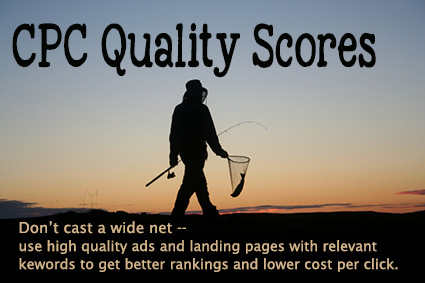Your cart is currently empty!

CPC Quality Scores
Tami Dowers, who was the paid search person at a company where I served as the organic search person, once told me that Google Ads is like an auction where whether you get the chair depends not only on what you’re willing to pay but also on how the chair will look in your living room.
I think that’s a very useful way to look at quality scores for your CPC ads. Both Google and Bing use quality scores to determine what kind of rankings your ads will get and how much they will cost you.
Quality scores
Google tells us exactly what they look at when they’re assessing quality score:
- Your clickthrough rate (CTR): This includes how frequently people have clicked through to your page when they see your ad, but it also includes your CTR history — how often people click through your ads at all. The more compelling your ads, the higher your quality score.
- Your landing page: The page people reach when they click on your ad is the landing page. Google always wants to provide Google users (the people searching for things at Google.com) with a great experience. When you help them do that by sending folks to a high quality, relevant web page, you get a higher quality score. This includes the overall quality of your website, including navigation and content, as well as how good a match there is with your ad and keyword.
- Your relevance: If a customer searches for “men’s skin care” and you have chosen the keyword “men’s skin care,” then your ad had better be about men’s skin care, with a link to your website’s page on men’s skincare.
- Your target performance: When you target a certain geographic area or place your ads on certain websites, Google notices how well you do in that particular place, whether it’s geographic or virtual. Make sure you target the right places. Equally, when you target your ads to particular devices, you have to provide a good experience. If your site is not mobile-friendly, don’t place mobile ads.
Bing boils it down to three points:
- Your landing page user experience: the quality and usability of your landing page
- Your landing page relevance: the relevance of your ad and your landing page to the keyword the searcher uses
- Your keyword relevance: how well your keyword choices reflect your ads and landing pages
Bing says that they don’t use the quality score to determine whether your ad shows first or second or later, as Google does. They also update quality scores less often than Google does, and they say that your competitors’ quality scores can affect yours — if your competitors are optimizing their ads and landing pages and you are not, your quality scores can fall when you’ve made no changes.
Quality scores, then, are based on the quality and relevance of your ads and your landing pages, which will be affected by the overall quality of your website. We’re back to offering visitors a great experience — and nobody should be surprised by this. That’s all the search engines have to offer their customers, so that is quite naturally what they’ll reward.
Your keywords
However, this can really require a change of mindset for traditional marketers. In legacy media like TV and magazines, the goal is to spread a message far and wide, getting as many eyeballs as possible to look at the message in hopes that some of them might be interested. People who are used to this “spray and pray” approach often want to use lots of barely-relevant keywords in hopes of catching the attention of as many people as possible. They also often want to dump visitors at their homepage in hopes that people who are interested in men’s skincare will also be interested in some of their other stuff.
Hope is not a strategy.
Actually, if you’re selling men’s skincare products, you want to talk to people who are interested in men’s skincare products. These are the guys who are reading blog posts and product reviews about the subject, Googling “men’s skincare,” and watching videos at The Grooming Lounge.
Once you get comfortable with this new, closely targeted approach to marketing, you can see the obvious ways to improve your quality scores for CPC:
- Choose the right keywords.
- Write compelling ads.
- Link your ads to great landing pages.
- Make your entire website as great as possible.
Don’t cast a wide net with paid search. Narrow in on the fish you want — the fish who want what you have to offer — and provide them with the best bait you can.
by
Tags:

Leave a Reply